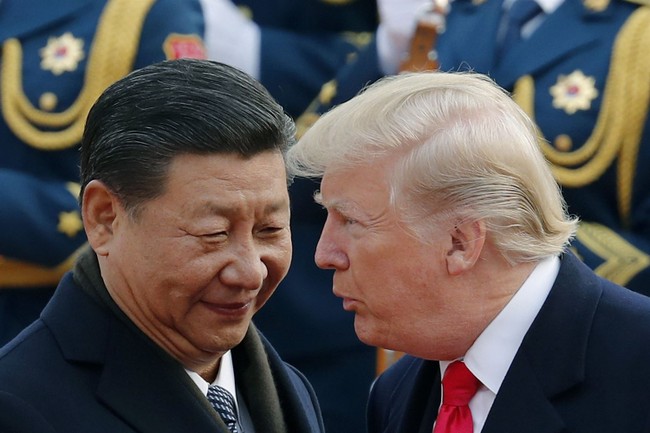
In the tariff war between China and the United States, a lot of chatter in the Pravda Media is about Xi Jinping’s defiance, his outreach to European countries and other less important but collectively significant developing countries, and his retaliatory moves against America.
They make it sound like China has a lot of cards to play in the trade war with America.
China has put civilian government officials on a “wartime footing” and ordered a diplomatic charm offensive aimed at encouraging other countries to push back against U.S. President Donald Trump’s tariffs. https://t.co/rZWU2zsARQ
— The Japan Times (@japantimes) April 14, 2025
Collectively, these stories tell a tale: Donald Trump may have bitten off more than he can chew in his economic war with China. Trump’s moves will hollow out the American middle class! Europe will choose China over the United States! We are doomed!
The Chinese are putting up a very brave front, until recently matching Trump’s blow for blow and pointing to Chinese willingness to endure everything up to eating grass for a year to defeat their adversaries. The Chinese plan for the long term!
Yeah, well, not so much.
It all sounds impressive, and some pissed-off ally countries have even hinted at turning Chinaward as a response to what they consider a stab in the back from President Trump.
China’s container bookings to plunge up to 60% as US tariffs wipe out tradehttps://t.co/90A7GGHqUV
— South China Morning Post (@SCMPNews) April 16, 2025
Except…Reality. Our ticked-off allies are acting like 6-year-old children angry at their parents, threatening to run away. As much as they resent the United States, they are utterly dependent upon us and chose to be so. They are militarily weak and have sputtering economies that rely on the US as an export market. The United States, not themselves, defends its sea lines of communication, and they all know that China is a predatory power and not a reliable economic partner.
“Experts say the relationship bt #Europe & #China is rooted in a decades-old reality: a Chinese marketplace effectively closed to many EU cos bc of regulatory burdens & the Party’s buttressing of Chinese cos…The EU trade deficit w/🇨🇳 was $332B in 2023″https://t.co/iWkxZCMKbL
— China Beige Book (@ChinaBeigeBook) April 16, 2025
The US not only represents 25% of the world economy, which is quite impressive in itself. But it has about 40% of the world’s consumer spending. No manufacturer of consumer products can afford to turn their backs on the US. China may be an attractive market, but it is not sufficiently large enough to make a dent in their losses should the US close our markets to them.
Which brings us to China itself.
🟢🇺🇸The #US started the #tariffwar
–disrupting global trade and market stability🌎🟢🇨🇳#China responded with necessary countermeasures
–to safeguard its rightful interests and uphold international fairness & justice.🛡🟢🕊For real negotiations to work, the #US must… https://t.co/g6ANoIGrmr pic.twitter.com/RoHVzXO4K0
— Chinese Embassy in US (@ChineseEmbinUS) April 16, 2025
All that bluster sounds good, but it hides a stark reality: their economy is utterly dependent on US consumption. As much power as they have over us–they can cause us temporary pain as we adjust to finding new suppliers–we have infinitely more over them. Even their holdings in US debt are a double-edged sword. The US has relied on China to purchase government bonds, but as the old saying goes–if you owe the bank a small amount of money, they have power over you. If you owe the bank a billion dollars, you have power over them.
The tariffs on China have been DEVASTATING. Not will be devastating. They are already devastating.
🚨SOLVENCY ISSUES: Xi Jinping cannot ‘wait out’ Donald Trump’s tariffs
China’s economy is reeling from the impact of tariffs, and public discontent is growing. On Douyin, China’s version of TikTok, videos show citizens openly criticizing the government’s rigid stance on tariffs,… pic.twitter.com/rJQkrZfAVW— Project Constitution (@ProjectConstitu) April 16, 2025
SOLVENCY ISSUES: Xi Jinping cannot ‘wait out’ Donald Trump’s tariffs
China’s economy is reeling from the impact of tariffs, and public discontent is growing. On Douyin, China’s version of TikTok, videos show citizens openly criticizing the government’s rigid stance on tariffs, with some even taking to the streets in protest. Chinese authorities are cracking down, forcibly dispersing crowds and suppressing evidence of unrest, but these efforts can only hold for so long. As joblessness and food shortages deepen, desperation is setting in, pushing people to the brink. China’s heavy reliance on the U.S. market gives America the upper hand—we can outlast them until they yield or face internal upheaval, potentially threatening President Xi’s leadership.
China’s government is and appears quite strong because it is. But something can be both very strong and very brittle–meaning that it performs well until the moment it shatters. Think ceramics or glass, both of which can be very strong until the moment they shatter. They don’t bend and spring back–they are good until the breaking point, and then boom.
Exclusive: The Trump administration plans to use ongoing tariff negotiations to pressure U.S. trading partners to limit their dealings with China https://t.co/8IvIESCzHK
— The Wall Street Journal (@WSJ) April 16, 2025
China’s government is not loved, but it is tolerated because it is strong and because it generally delivers on its major promise: economic growth, pulling a billion people out of poverty as quickly as possible.
Tariffs aren’t just a threat to that strategy. If Trump really pushes, Xi Jinping’s government is in real trouble, and not the kind of trouble that means a midterm loss or failure to get reelected. This is regime-threatening. Xi, who looked to be in the catbird seat, could be facing a collapse of his legitimacy as leader of China.
The U.S. plans to use tariff negotiations to pressure its trading partners into isolating China’s economy. In exchange for tariff reductions, nations may face demands to limit Chinese involvement in their markets, potentially weakening Beijing’s position ahead of future talks.… pic.twitter.com/Id30hyyRHs
— Spotlight on China (@spotlightoncn) April 17, 2025
The Trump administration plans to use ongoing tariff negotiations to pressure U.S. trading partners to limit their dealings with China, according to people with knowledge of the conversations.
The idea is to extract commitments from U.S. trading partners to isolate China’s economy in exchange for reductions in trade and tariff barriers imposed by the White House. U.S. officials plan to use negotiations with more than 70 nations to ask them to disallow China from shipping goods through their countries, prevent Chinese firms from locating in their territories to avoid U.S. tariffs, and not absorb China’s cheap industrial goods into their economies.
These measures are meant to put a dent in China’s already rickety economy and force Beijing to the negotiating table with less leverage ahead of potential talks between Trump and Chinese President Xi Jinping. The exact demands could vary widely by nation, given their degree of involvement with the Chinese economy.
China’s strategy of growing its economic power and influence depends on a river of money with its headwaters in the United States. And its ability to make deals in countries not hostile to the United States is only possible because the US tolerates its moves and is committed to using only modest soft power to oppose the moves.
Donald Trump is not in a mood to tolerate expanding Chinese influence. Look at the Panama Canal port deals. Trump’s goal is not so much to own the canal as to deny China influence in the region. China, not Panama, is the target.
In fact, most of Trump’s seemingly bizarre foreign policy moves–Canada as the 51st state and annexing Greenland are about trying to change the political geography to keep China from gaining influence in the Arctic.
The flow of information out of China on economic performance since the tariffs hit is sparse, but I have been checking in on the social media chatter coming out of China, and the news is bleak. Consumer spending is down, export products are being sold at firesale prices, and business owners are locking doors and leaving employees unpaid. This is all chatter right now, but also likely true.
Trade wars suck for everybody involved, and when the cost of Chinese-made products go up there will be some pain here in the United States, whatever Trump and his people say.
But none of this pain will be an existential threat to Trump, the country, or the Republican Party. There will be a price to pay, but it will be modest in the longer term.
Not so for China. Their regime is under threat because their hand is much, much weaker. Weaker than Trump’s and weaker than people think.
Of course, if China were a normal country, what Trump is doing would be a horrible policy. Generally speaking, destroying a trading partner’s economy is both morally questionable and terrible for business. Normally you would cut a deal.
But China and the United States are heading for a war, and a big one at that. Xi Jinping has made that abundantly clear, and he has counted on making the US economy dependent on China to keep us cowed.
Trump is turning that logic on its head.







